#but that doesn’t mean they doxxed them and there is zero evidence to suggest as much. they’ve said they didn’t so like. nothing to go on.💀
Text
ok I genuinely think @is-the-owl-video-cute has gone off the deep end. what makes you act like that on the internet for real. I don’t even have a real stock in this bullshit drama but they are just the most reactionary asshole to people? how can y’all look up to them they are genuinely so immature and pissy. they’ve been throwing a fit over users they personally dislike and using absolutely no proof at all to say they doxxed ppl. there’s like zero proof other than they don’t like them LMAO. can y’all log the fuck off please?? before someone actually gets hurt??
#is-the-owl-video-cute#yeah I’m tagging actually I hope ppl searching for drama see this and get a reality check#I saw that archived link what the actual fucking shit in hell were they thinking typing that?#they arent fucking animal murderers. they don't like the way scout handles their media presence or their farm#but that doesn’t mean they doxxed them and there is zero evidence to suggest as much. they’ve said they didn’t so like. nothing to go on.💀#(frankly also. scout and owlvid should be able to handle criticism and disagreements like normal fucking people#instead of flying off the handle literally every single time. like it’s a pattern)#I think both of them should just log off until they learn to handle this shit in a normal way#and without encouraging their impressionable followers to go on witch-hunts after ppl.#especially bc they don’t like it when it happens to them?? yet they say NOTHING when their followers start harassing ppl?? telling lol#I can’t stand it. y’all aren’t educators and you will never be the end all be all of every opinion you have. stop assuming such.#owlvid has had wildly inaccurate ‘facts’ about rabbits before but acting like they KNOW this shit is infuriating.#I guess I shouldn’t be surprised that every ‘is the x animal cute’ blog has gone to shit and up a creek though#just particularly disappointed in owlvid and scout for the way they’ve handled this#while KNOWING the amount of followers that would swallow their boots all the way their their head if they could#like. cmon. you can say you don’t know enough abt this subject to comment. it’s ok.#and I think scout should be able to handle and address criticisms abt their cows without losing it every single time like#I’ve never met a good farmer that can’t handle criticism for their animals. it’s part of the job you won’t please everyone#and if you are planning on being an educator you have to be able to handle those criticisms with a level head and understanding.#that’s not what owlvid OR scout do. they are influencers on a power trip.#if you want respect you have to give it. not one of the dreaded rabbit people have been disrespectful about their criticism.#it is not so the other way around and that’s telling as hell#the only time I’ve seen these apparently evil sadistic rabbit bloggers make sardonic or disrespectful (I guess?) comments is on their own#and when they’re frustrated about being labeled like they kick puppies for fun for being a fucking normal ass farmer lol#you’d think maybe scout would be able to get that. maybe not so much owlvid bc they don’t seem to understand rural animal care#for the record I’m not looking at any of these blogs involved with scrutinizing detail bc I have better things to do#but I have kept an eye on the situation w scout and animal control being called and how it got twisted into ‘doxxing and swatting’#by high strung ppl who should not have been online#I value my blood pressure too much the urge to just turn off my phone overcomes any desire to look through the drama
35 notes
·
View notes
Text
Wikipedia just turned 20!!!

[ID: Origami W, a gift for wikipedia END ID]

[ID: Origami models of arabic numerals two and zero, symbolizing wiki’s 20th birthday END ID]
send thanks and love to wikipedians.>>>
have a looksie at the birthday celebrations(twas on 15th), and confetti are still around.>>>
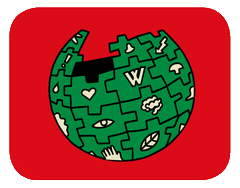
[ID: gif of puzzle globe(wiki logo) bursting, metaphorically the burst of knowledge and joy wiki gives, a gif from the creative commons bday stash of wikipedia END ID]
“Wikipedia started as an ambitious idea
…to create a free encyclopedia, written by volunteers, for everyone in the world. It seemed impossible.
Over 20 years, Wikipedia has become the largest collection of open knowledge in history. How did it happen? People, like you.
Made and sustained by humans.
Meet the movement.”
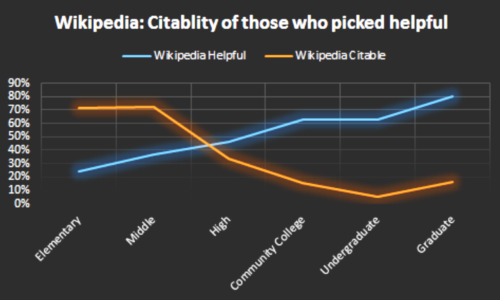
[ID: Graph,WIkipedia: citability vs helpfulness of articles on academic timescale .helpfulness increases from elementary academia to graduate academia as wikipedia articles are stuffed with knowledge from archives and enthusiasts, but elitist academic institutions have created a situation wherein the citability of these articles drops down from elementary levels to graduate studies. END ID]
graph is taken from this aptly named article, “time to stop wikipedia shaming”
It is as if the main theme of wikipedia “ is edited by everyone” is taken as a flaw. the fascist and elitist gate-keeping control is not more evident anywhere but when wikipedia is shamed. Articles are locked, users banned and multiple people editing it makes it much more reliable than papers and books written by bigoted academics and reviewed by bribed editors (case in point- Sigmund Froyd’s theory of female sexuality, cough cough)
It is “the best thing ever,” because “anyone in the world can write anything they want about any subject—so you know you are getting the best possible information.” - Michael Scott - The Office
This dialogue was used to identify Michael as an idiot, but it has the opposite effect, as this is truly the most beautiful missions of all time.
The thing about wikipedia is it is a macrogasmic entity of knowledge. Edits materialize at a rate of 1.8 per second. But perhaps more remarkable than Wikipedia's success is how little its reputation has changed. It was criticized as it rose, and it still is a matter of superiority complex in academic gate-keepers to state that Wikipedia is a blog and encyclopedias are more trustworthy etc etc, that wikipedia is not a source, and similar shaming tactics, when actually wikipedia is, in fact a tertiary SOURCE and, a more frequently updated encyclopedia.
Wiki is the only not-for-profit site in the top 10 most used sites , and one of only a handful in the top 100. It does not plaster itself with advertising(it could, but it doesn't, just to make it a comfortable and easily comprehensable resource), intrude on privacy, or provide a breeding ground for neo-Nazi trolling, and still broadcasts user-generated content. Unlike the other top social platforms , it makes its product de-personified, collaborative, and for the general good. More than an encyclopedia, Wikipedia has become a community, a library, a constitution, an experiment, a political manifesto—the closest thing there is to an online public square. It is one of the few remaining places that retains the faintly utopian glow of the early World Wide Web. A free encyclopedia encompassing the whole of human knowledge, written almost entirely by unpaid volunteers: Can you believe that was the one that worked?
Wikipedia is not perfect. The problems that it does have—and there are plenty of them—are discussed in great detail on Wikipedia itself, often in dedicated forums for self-critique with titles like “Why Wikipedia is not so great.” One contributor observes that “many of the articles are of poor quality.” Another worries that “consensus on Wikipedia may be a problematic form of knowledge production.” A third notes that “someone can just come and edit this very page and put in ‘pens are for cats only.’” Like the rest of the tech world, the site suffers from a gender imbalance; by recent estimates, 90 percent of its volunteer editors are men. Women and nonbinary contributors report frequent harassment from their fellow Wikipedians—trolling, doxing, hacking, death threats. The site's parent organization has repeatedly owned up to the situation and taken halting steps to redress it; several years ago, it allocated hundreds of thousands of dollars to a “community health initiative.” But in a way, the means to fix Wikipedia's shortcomings, in terms of both culture and coverage, are already in place: Witness the rise of feminist edit-athons.
The site's innovations have always been cultural as well as computational. It was created using existing technology. This remains the single most underestimated and misunderstood aspect of the project: its emotional architecture. Wikipedia is built on the personal interests and idiosyncrasies of its contributors; in fact, without getting gooey, you could even say it is built on LOVE. Editors' passions can drive the site deep into inconsequential territory—exhaustive detailing of dozens of different kinds of embroidery software, lists dedicated to bespectacled baseball players, a brief but moving biographical sketch of Khanzir, the only pig in Afghanistan. No knowledge is truly useless, but at its best, Wikipedia weds this ranging interest to the kind of pertinence where Larry David's “Pretty, pretty good!” is given as an example of rhetorical epizeuxis. It is one of the reminders, that the internet is a wonderful space.
In 2000, around a year before Jimmy Wales and Larry Sanger cofounded Wikipedia, the pair started a site called Nupedia, planning to source articles from noted scholars and put them through seven rounds of editorial oversight. But the site never got off the ground; after a year, there were fewer than two dozen entries. (Wales, who wrote one of them himself, told The New Yorker “it felt like homework.”) When Sanger got wind of a collaborative software tool called a wiki—from the Hawaiian wikiwiki, or “quickly”—he and Wales decided to set one up as a means of generating raw material for Nupedia. They assumed nothing good would come of it, but within a year Wikipedia had 20,000 articles. By the time Nupedia's servers went down a year later, the original site had become a husk, and the seed it carried had grown beyond any expectation.
Many similar sites have languished. They came up against a simple and apparently insoluble problem, the same one that Nupedia encountered and Wikipedia surmounted: Most "experts" do not want to contribute to a free online encyclopedia.
This barrier to entry exists even in places where there are many "experts" and large volumes of material to draw from. Napoleon Bonaparte, for instance, is the subject of tens of thousands of books. There are probably more dedicated historians of the Corsican general than of almost any other historical figure, but so far these scholars, even the retired or especially enthusiastic ones, have been disinclined to share their bounty. Citizendium's entry on Napoleon, around 5,000 words long and unedited for the past six years, is missing events as major as the decisive Battle of Borodino, which claimed 70,000 casualties, and the succession of Napoleon II. By contrast, Wikipedia's article on Napoleon sits at around 18,000 words long and runs to more than 350 sources.
The Wikipedia replacement products revealed another problem with the top-down model: With so few contributors, coverage was spotty and gaps were hard to fill. Scholarpedia's entry on neuroscience makes no mention of serotonin or the frontal lobes. At Citizendium, Sanger refused to recognize women's studies as a top-level category, describing the discipline as too “politically correct.” (Today, he says “it wasn't about women's studies in particular” but about “too much overlap with existing groups.”) A wiki with a more horizontal hierarchy, on the other hand, can self-correct. No matter how politically touchy or intellectually abstruse the topic, the crowd develops consensus. On the English-language Wikipedia, particularly controversial entries, like those on George W. Bush or Jesus Christ, have edit counts in the thousands.
Wikipedia, in other words, isn't raised up wholesale, like a barn; it's assembled grain by grain, like a termite mound. The smallness of the grains, and of the workers carrying them, makes the project's scale seem impossible. But it is exactly this incrementalism that puts immensity within reach.
The stars of Wikipedia are not giants in their fields but so-called WikiGnomes—editors who sweep up typos, arrange articles in neatly categorized piles, and scrub away vandalism. This work is often thankless, but it does not seem to be joyless. It is a common starting point for Wikipedians, and many are content to stay there. According to a 2016 paper in the journal Management Science, the median edit length on Wikipedia is just 37 characters, an effort that might take a few seconds.
From there, though, many volunteers are drawn deeper into the site's culture. They discuss their edits on Talk pages; they display their interests and abilities on User pages; some vie to reach the top of the edit-count leaderboard. An elect few become administrators; while around a quarter of a million people edit Wikipedia daily, only around 1,100 accounts have admin privileges. The site is deep and complex enough—by one count, its policy directives and suggestions run to more than 150,000 words—that its most committed adherents must become almost like lawyers, appealing to precedent and arguing their case. As with the law, there are different schools of interpretation; the two largest of these are deletionists and inclusionists. Deletionists favor quality over quantity, and notability over utility. Inclusionists are the opposite.
Most dedicated editors, whether deletionist or inclusionist, are that category of person who sits somewhere between expert and amateur: the enthusiast. Think of a railfan or a trainspotter. (Wikipedians disagree on which is the better term.) Their knowledge of trains is quite different from an engineer's or a railway historian's; you can't major in trainspotting or become credentialed as a railfan. But these people are a legitimate kind of expert nonetheless. Previously, their folk knowledge was reposited in online forums, radio shows, and specialist magazines. Wikipedia harnessed it for the first time. The entry on the famous locomotive the Flying Scotsman is 4,000 words long and includes eye-wateringly detailed information on its renumbering, series of owners, smoke deflectors, and restoration, from contributors who seem to have the most intimate, hard-won knowledge of the train's working. (“It was deemed that the A4 boiler had deteriorated into a worse state than the spare due to the higher operating pressures the locomotive had experienced following the up-rating of the locomotive to 250 psi.”)
Pedantry this powerful is itself a kind of engine, and it is fueled by an enthusiasm that verges on love. Many early critiques of computer-assisted reference works feared a vital human quality would be stripped out in favor of bland fact-speak. That 1974 article in The Atlantic presaged this concern well: “Accuracy, of course, can better be won by a committee armed with computers than by a single intelligence. But while accuracy binds the trust between reader and contributor, eccentricity and elegance and surprise are the singular qualities that make learning an inviting transaction. And they are not qualities we associate with committees.” Yet Wikipedia has eccentricity, elegance, and surprise in abundance, especially in those moments when enthusiasm becomes excess and detail is rendered so finely (and pointlessly) that it becomes beautiful.
In the article on the sexual revolution, there was a line, since deleted, that read, “For those who were not there to experience it, it may be difficult to imagine how risk-free sex was during the 1960s and 1970s.” This anonymous autobiography in miniature is an intriguing piece of editorializing, but it's also a little legacy of the sexual revolution all by itself, a rueful reflection on a moment of freedom that didn't last. (The editor who added “Citation needed” is part of that story as well.) In the article on the anticommunist intellectual Frank Knopfelmacher, we learn that “his protracted, usually freewheeling, invariably slanderous late-night telephone monologues (visited alike upon associates and, more often, antagonists) retained a mythic status for decades among Australian intellectuals.” The Hong Kong novelist Lillian Lee, we are told, seeks “freedom and happiness, not fame.”
Pedants have a reputation for humorlessness, but for Wikipedians a sense of humor is at the core of the good-faith collaboration that defines the project. There is probably no need for an exhaustive history of a giant straw goat erected in a Swedish town each Christmas, but the article on the Gävle Goat chronicles its annual fate fastidiously. It is prone to vandalism by fire, and the article centers around an exacting timeline that lists the date of destruction, the method of destruction, and the new security measures put in place every year since 1966. (In 2005, it was “burnt by unknown vandals reportedly dressed as Santa and the gingerbread man, by shooting a flaming arrow at the goat.”)
Why do Wikipedians perform these millions of hours of labor, some expended on a giant straw goat, without pay? Because they don't experience them as labor. “It's a misconception people work for free,” Wales told the site Hacker Noon in 2018. “They have fun for free.” A 2011 survey of more than 5,000 Wikipedia contributors listed “It's fun” as one of the primary reasons they edited the site.
This is why the meta side of Wikipedia—the Talk pages, the essay commentaries, the policies—is suffused with nerdy jokes. We're so used to equating seriousness with importance that this jars at first: It's hard to square the encapsulation of all human knowledge with a policy called “Don't be a dick” (since revised to “Don't be a jerk”). But expressing the directive that way carries a purpose. It's the same purpose that drives Wikipedians to collect and celebrate the site's “Lamest edit wars,” which include long-running skirmishes on Freddie Mercury's ancestry, the provenance of Caesar salad, the proper pronunciation of J. K. Rowling's surname (“Perhaps it rhymes with ‘Trolling’?”), the wording of certain captions (“Is the cat depicted really smiling?”), and the threshold of notoriety required to appear on a list of fictional badgers.
Few architects of a world encyclopedia would think to include a forum for jokes, and in the unlikely event that they did, no one could anticipate that it would be important. But on Wikipedia the jokes are very important. They defuse tensions. They foster joyful cooperation. They encourage humility. They promote further reading and further editing. They also represent a surprise return to the earliest days of Enlightenment reference works. Samuel Johnson's dictionary, compiled in 1755, gives one definition of “dull” as “not exhilarating; not delightful: as, to make dictionaries is dull work.” Perhaps the most important encyclopedia of the late modern period, the Encyclopédie, is barbed with satirical and anticlerical quips: The entry on “Cannibals” cross-references with “Communion.”
Wikipedia ought to serve as a model for many forms of social endeavor online, but its lessons do not translate readily into the commercial sphere. It is a noncommercial enterprise, with no investors or shareholders to appease, no financial imperative to grow or die, and no standing to maintain in the arms race to amass data and attain AI supremacy at all costs. At Jimmy Wales' wedding, one of the maids of honor toasted him as the sole internet mogul who wasn't a billionaire. And that's what's awesome about it. It realizes that in as a society, we don't have to work to sustain ourselves, that's something we built the society for, we work to collect what we like, and that's our earning from the labour. Wikipedians work for curiosity and satisfaction and collect knowledge and joy.
The site has helped its fellow tech behemoths, though, especially with the march of AI. Wikipedia's liberal content licenses and vast information hoard have allowed developers to train neural networks much more quickly, cheaply, and widely than proprietary data sets ever could have. When you ask Apple's Siri or Amazon's Alexa a question, Wikipedia helps provide the answer. When you Google a famous person or place, Wikipedia often informs the “knowledge panel” that appears alongside your search results.
These tools were made possible by a project called Wikidata, the next ambitious step toward realizing the age-old dream of creating a “World Brain.” It began with a Croatian computer scientist and Wikipedia editor named Denny Vrandečić. He was enthralled with the online encyclopedia's content but felt frustrated that users could not ask it questions that required drawing on knowledge from multiple entries across the site. Vrandečić wanted Wikipedia to be able to answer a query like “What are the 20 largest cities in the world that have a female mayor? The knowledge is obviously in Wikipedia, but it's hidden. To get it out would be huge work.” .
Drawing on an idea from the early internet called “the semantic web,” Vrandečić set out to structure and enrich Wikipedia's data set so that it could, in effect, begin to synthesize its own knowledge. If there were some way to tag women and mayors and cities by population size, then a correctly coded query could return the 20 largest cities with a female mayor automatically. Vrandečić had edited Wikipedia in Croatian, English, and German, so he recognized the limitations of using plain English semantic tagging. Instead, he chose numerical codes. Any reference to the book Treasure Island might be tagged with the code Q185118, for example, or the color brown with Q47071.
Vrandečić assumed this coding and tagging would have to be carried out by bots. But of the 80 million items that have been added to Wikidata so far, around half have been entered by human volunteers, a level of crowdsourcing that has surprised even Wikidata's creators. Editing Wikidata and editing Wikipedia, it turns out, are different enough that they don't cannibalize the same contributors. Wikipedia attracts people interested in writing prose, and Wikidata compels dot-connectors, puzzle-solvers, and completionists. (Its product manager, Lydia Pintscher, still comes home from a movie and manually copies the cast list from IMDb into Wikidata with the appropriate tags.) ANd wikipedia is amazing because it isn't bothered by the possoibility that AI does sort of take over, or that there is canabalistic editing, its an evolving landscape, with its freedom to exist.
As platforms like Google and Alexa work to provide instant answers to random questions, Wikidata will be one of the key architectures that link the world's information together. The system still results in errors sometimes—that's why Siri briefly thought Bulgaria's national anthem was “Despacito”—but its prospective scale is already more ambitious than Wikipedia's. There are subprojects aiming to itemize every sitting politician on earth, every painting in every public collection worldwide, and every gene in the human genome into searchable, adaptable, and machine-readable form.
The jokes will still be there. Consider Wikidata's numerical tag for the author Douglas Adams, Q42. In Adams' book The Hitchhiker's Guide to the Galaxy, a group of hyperintelligent beings build a vast, powerful computer called Deep Thought, which they ask for the “Answer to the Ultimate Question of Life, the Universe, and Everything.” What comes out is the number 42. That wink of self-awareness—at the folly and joy of building something as preposterous and powerful as a world brain— is why, with Wikipedia, you know you are getting the best possible information.
#wikiKind#wikiLove#wikipedia20#wikipedia#ofcourse i know there's likelihood of obsecure articles being biased#but there's also the fact that obsecure articles can exist here#thats a start#as more people use wikipedia#even those articles normalize(as in they stop being extremist)#thats a demographical fact#no censorship is essential#obviously people misuse it#but wikipedia lock system handles fascist articles the right way#rather than using control and silencing#those are the tools of fascists#and wikipedia refuses to use them#isn;t that beautiful?#wikepedia is like the constantly condescended teen girl#who does hold her principles#and through flaws and falls accomplishes rather respectful things#that no one credits her for
2 notes
·
View notes
Note
I love when Sterek or Steter fandom come at us with claims of having such and such devastating evidence of our heinous crimes (on anon no less) and then.... never produce it. They're so pathetic and cowardly, hoping they can unnerve us like cyber bullies stuck in 2014. But that is their MO, claiming things with no proof and lying about it
I love it as well, but to be quite honest, those aren’t the people I’m worried about. The weaknesses in the positions of the Sterek and Steter extremists are obvious to the casual observer. I feel that they are motivated by lust, decadence, and the temptation of the forbidden. If I may be so bold, not a single one of them would find life in a world run according to the philosophies of Peter Hale pleasant or even endurable. If any of them were treated by someone the way Derek Hale treats Scott McCall in the first two seasons of the show, they would be on the phone to the police immediately. If someone threw them up against the wall and spoke to them the way Derek did to Stiles, they wouldn’t call it banter, they’d call it abuse. If they had a sibling who behaved like Stiles, they’d be on Reddit complaining about him.

The weakness of their position is revealed in their arguments. They know the production determined that Scott would be the hero protagonist and a glance at his actions and behavior shows this to be irrefutable. So, they fixate on his flaws and missteps -- included in the story to demonstrate the growth of the character and to prevent him from being a Mary Sue -- and try to use those to delegitimize his role. Racism is extraordinarily handy in this pursuit, but it often fails when confronted by people who feel the same as I do. They do not like this at all.
Their tactics, as a consequence, grow shrill. They’ll fill people’s anonymous inboxes with aggressive and repetitive accusations while simultaneously accusing people of harassment. I know what harassment is, and it’s not responding to a post with commentary on an Internet platform designed to encourage people to respond with commentary. They’ll dox, threatening people with exposure of their identities (I know this because they’ve done it to me -- I’ve never been threatened with someone linking to my Facebook page before. It’s enlightening, but unfortunately for them, I seldom say something I regret, and when I do make a mistake, I like being corrected). They’ll claim receipts whose efficacy vanishes like a vampire at brunch when those receipts’ full context is known. And they always have funny gifs.
No, those aren’t the people that concern me. They’re annoying and sometimes enraging, but their greatest crime is the cover they give the more casual and seemingly harmless racism of the vast majority of fans.
You see, racism in the Teen Wolf fandom seldom takes the form of ugly attacks against the main character (or his girlfriend Kira, or his mentor Deaton, or his pack member Mason, or his ally Braeden, or his ally Boyd, or his acquaintance Danny, or his girlfriend’s family. The exception to this is the villain Monroe, the attacks against are usually incoherent misogyny). Racism in the fandom usually takes the form of benign neglect or obtuse manipulation, such as:
Every time a fan portrays Gerard forcing Scott to force Derek to bite him in Master Plan as the worst thing that happens on the show while ignoring the action’s context, including the fact that Gerard had Jackson’s claws to Allison’s throat and Scott believed that doing so would save Derek’s life, yet at the same time explaining every shitty thing Derek did to Scott in Season 1 and 2 (stalking, violence, manipulation, lies, and betrayal) was ‘for Scott’s own good’, while with the same breath pretending that Stiles wouldn’t congratulate Scott on outwitting both Gerard and Derek.
Every time a fan suggests Scott is a bad friend because he doesn’t prioritize the treatment of Stiles’s low self-esteem -- a situation they exaggerate to an uncomfortable degree -- over not becoming Peter’s murder beta or stopping the Argent/Hale feud or protecting people from the Alpha Pack. They present it as Scott spending all his time with Allison (or, weirdly enough, with Isaac) when in fact Scott spends most of his time fighting villains who are older, stronger, and more knowledgeable than he is. Yes, Scott chooses to save lives rather than make Stiles feel special, and to them, that’s disqualifying. They consider this Scott failing in the duties of friendship, but neglect the suggestion that Stiles’s vicarious use of Scott’s lycanthropy to augment his self-esteem isn’t a violation of those same duties.
Every time a fan repeats the mantra “Stiles is always right,” when it is ludicrously easy to show that Stiles is the farthest thing from ‘always right’ there is, because they’re not really saying that he never makes a mistake. Their implied meaning is that Stiles should be the one making the decisions but always without the commensurate responsibilities, a ‘power behind the throne.’ These are the same people who glorify Stiles’s darker nature and trumpet his insecurities, yet still think that he should be in charge.
Every time a fan tries to make Liam Dunbar’s anchor Theo Raeken when we see repeated instances that Liam’s true anchor is Mason Hewitt. Because Liam couldn’t focus his humanity in his best friend who stood by his side since the episode after his first appearance. Nope, his anchor must be the man who inspired him to commit murder and manipulated him for thirty episodes.
These statements have one thread in common -- a denial of the minority characters’s importance to the story. How do I know this? Because they don’t spend any time talking about how Derek betrayed Scott in Co-Captain. Because they don’t spend any time talking about how Stiles demonstrated zero faith in Scott after A Novel Approach. Because they ignore Scott’s success in turning enemies to allies, something Stiles never did. Because they treat Scott anchoring in Allison as sexual obsession and a crime against Stiles’s relationship, but propose that Stiles shifting loyalty to Derek and Liam discarding Mason for Theo are desirable outcomes. I do not feel the fact that the characters diminished in these fandom trends (as well as others) are minority characters is a coincidence.
15 notes
·
View notes
Photo
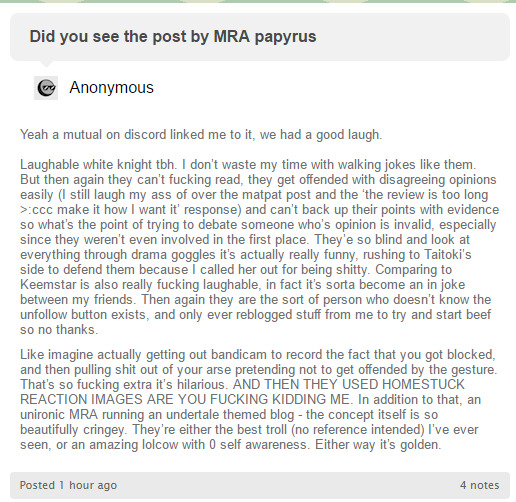

Okay, let me preface this by saying that this is the absolute last thing I’ll say regarding this drama. For a few reasons.
1. Seashel’s just gonna resort to the same dumb ass insults that he’s using right now if he finds this post, and this will become redundant quickly.
2. Taitoki has apologized and wants to move on from this, and especially since she follows me, I don’t want her to have to see more of this.
3. Generally, I don’t want to spam my followers with drama they don’t care about.
So seashel can talk more shit if he wants to. He can hide behind his block like the spineless coward he is and hurl the same insults I’ve heard a thousand times from other people. I’m not dignifying him with any more responses after this one. He’s not worth my time.
With that being said, let’s pick this apart. Under the cut.

Are you seriously calling me a white knight just because I’m defending someone who happens to be female? Or do you just not know what the term “white knight” actually means?
Secondly, you agreed with my criticism of the absurd length of your review of that one bad space funeral game. Don’t sit here and act like it was me complaining like a bitch when you thanked me for giving constructive criticism to your review.
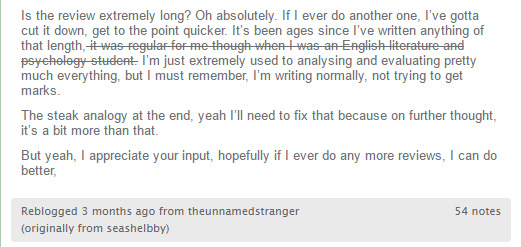
Look at this. Look at it.
Now stop lying
I’m not even touching the matpatt post because it’s just you being a fucking sperglord and acting all surprised when you insulted a youtuber and his fans and got blowback from said fans that you just insulted. And then you have the gall to say that matt’s fans can’t handle a slight ribbing because they were mildly upset when you insulted them.
...Well, shit, I ended up talking about that post anyway. Oh well.
I don’t get offended by much of anything. Disagreement doesn’t mean I’m offended, despite what you seem to think. Fuckin’ hell, if anything I’m elated. Seeing you bend over backwards and jerk yourself off like this is legitimately curing my depression. It’s just so much fun to mock you. I love it.
I don’t recall when I ever made a point to you that demanded evidence, but you frankly have absolutely fucking zero ground to speak when it comes to providing evidence. More on that in a second.

You know what, you’re right. I had no involvement with this drama. As far as the claims put forward, I’ll just let Taitoki speak for herself.
youtube
But here’s two things I can say with confidence about this whole situation.
1. You blow everything presented out of proportion
2. Your evidence is abysmal, and, according to the apology video, outdated.
The evidence you give for Taitoki being a “pedophile apologist” is her suggesting to a friend that he block some creeper that was harassing him. According to Taitoki’s apology, she apparently got angry at one point and said some things that made her sound like a pedo apologist. But not only does she categorically deny actually being one, the snippets of conversation you provide as evidence don’t help the case in the slightest.
The evidence you gave for her harassing Lineder? You saying in skype that she made jokes about his depression on stream. You literally cited yourself as a source.
According to the apology, Taitoki apparently made jokes during a stream that Lineder didn’t seem bothered by, but was then approached by someone else and told that Lineder was indeed upset by those jokes. This smells exceedingly fishy, but out of respect I’m going to take it at face value. This just seems to be a lack of communication, and will hopefully be resolved soon.
So if we be exceedingly generous, Taitoki is guilty of saying a bunch of hurtful things and fucking up a lot with shit she says, unintentionally looking like a bully and pedo apologist in the process.

Why are you comparing this to Bard?
You know, that sniveling little shit who doxxed you, sexually harassed your friends and wouldn’t leave you alone for almost half a year afterwards? You’re comparing her to someone who’s only guilty of mean words on the internet? Not only that, you’re acting like Taitoki’s somehow worse.
This is why I compared you to Keemstar. You blow things out of proportion and stir shit up about people on the internet. Only instead of doing it for internet points, you genuinely believe you’re doing something righteous.

More lying. I haven’t followed you since the bard drama, and I gladly reblog your stuff without beef when it isn’t saturated in bullshit drama.
Not to mention I was on your side during the Bard and Sodapop drama, when you called out people who were actually bad. I also reblogged plenty of your art back before you saturated the blog with drama. You know this. Stop lying.

Oh boy, this final paragraph is where Seashel just abandons any illusion of reasoning and just slings insults at me like monkey shit. This is all fluff and serves no purpose, but I’m gonna have plenty of fun mocking this after the intellectual rigor that was the rest of that post. It’ll be like a day at the spa.
imagine actually getting out bandicam to record the fact that you got blocked
I do that with everyone who blocks me. It’s part of my “wall of shame” tag. It’s because I kept having problems with people who block me and then pretend they didn’t block me when I block them back.
AND THEN THEY USED HOMESTUCK REACTION IMAGES ARE YOU FUCKING KIDDING ME.

I’m mostly doing it because I started reading it again, and pesterlogs make for great reaction images, just in case you really wanted to know.
Honestly, mocking someone’s choice of reaction image is just the lowest possible blow you can ever hope to use. It’s not scraping the bottom of the barrel, it’s punching a hole in the barrel and wearing it.
It’s for this reason that I will continue to use homestuck reaction images.

In addition to that, an unironic MRA running an undertale themed blog - the concept itself is so beautifully cringey.
I don’t really know what’s so cringeworthy about being an MRA. I also don’t run and “undertale themed blog” The only things Undertale on my blog are
1. My blog theme
2. My icon
3. Art I occasionally reblog
This is literally “lol ur a furry/brony blog” under a different name. Please stop.
Also, you call me cringey? You’re an adult, right? Presumably old enough to vote in the united states? Because you don’t act like one. You can’t take any confrontation without SCREAMING AND YELLING and hurling your own shit everywhere, and you mock others for not being able to accept different viewpoints when you can’t either.
I’m still a teenager. It’s kind of impossible for me to not be cringeworthy. You have no excuse.
Also.
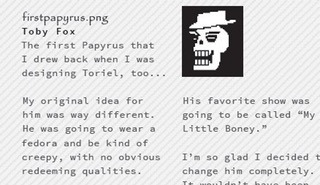
Papyrus was originally going to be an MRA/brony stereotype, according to the official artbook for Undertale.
I own this character, bitch
They’re either the best troll (no reference intended) I’ve ever seen, or an amazing lolcow with 0 self awareness. Either way it’s golden.
Why is it that whenever I make a serious point everyone assumes I’m a troll, and whenever I’m trolling people assume I’m being serious?
Also, how do I lack self awareness? Do you know what the phrase means? How complete is your understanding of the english language?
Also, your most recent posts at time of writing seem to be slandering me quite a lot, yet you refuse to use my actual username and just call me “the mra papyrus”. What, am I voldemort now? Will stating my name cause Ragnarok?
Anyway, I’m going to apply Ice Law, as Seashel once coined after the bard drama, and cease talking to or about him. This post is going on my wall of shame, and he will be on record as the most unbelievably cancerous people I’ve talked to on this website to date. Thank you Seashel, you reminded me of why I signed up in the first place.

3 notes
·
View notes